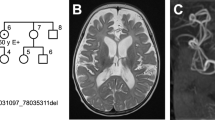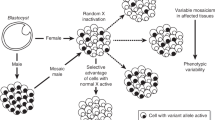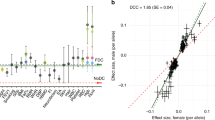Abstract
IN man, dosage compensation is achieved by random genetic inactivation of one X chromosome in each female cell early in embryonic life1; all descendants of this X chromosome then remain genetically inactive. The inactive X chromosome is late replicating and manifests itself as a sex chromatin body in the interphase somatic nuclei of females2,3. Because sex chromatin appears in human embryos approximately 12 days after conception4, it is presumed—although not certain—that X inactivation (Lyonization)5 occurs at this time. All human X-linked loci which have been tested hitherto have shown evidence of dosage compensation1. It is significant, however, that with one exception all these studies have been on older children or adults. A problem with the Lyon hypothesis is the existence of clinical abnormalities, particularly those of a non-sex-related nature, in patients with an abnormal number of X chromosomes. It suggests1,6 either that great damage can be done to human development by an abnormal number of X chromosomes before X-inactivation or that at least some X-linked loci must escape dosage compensation to a significant extent. This study supports the latter concept.
This is a preview of subscription content, access via your institution
Access options
Subscribe to this journal
Receive 51 print issues and online access
$199.00 per year
only $3.90 per issue
Buy this article
- Purchase on Springer Link
- Instant access to full article PDF
Prices may be subject to local taxes which are calculated during checkout
Similar content being viewed by others
References
Ohno, S., Sex Chromosomes and Sex-Linked Genes (Springer-Verlag, New York, 1967).
Morishima, A., Grumbach, M. M., and Taylor, J. H., Proc. US Nat. Acad Sci., 48, 756 (1962).
Ohno, S., The Sex Chromatin (edit. by Moore, K. L.), 113 (Saunders, Philadelphia, 1966).
Austin, C. R., The Sex Chromatin (edit. by Moore, K. L.), 241 (Saunders, Philadelphia, 1966).
Lyon, M. F., Nature, 190, 372 (1961).
Polani, P. E., Nature, 223, 680 (1969).
Steele, M. W., Biochem. Genet. (in the press).
Lowry, O. H., Rosebrough, N. J., Farr, A. L., and Randall, R. J., J. Biol. Chem., 193, 265 (1951).
Migeon, B. R., Der Kaloustian, V. M., Nyhan, W. L., Young, W. J., and Childs, B., Science, 160, 425 (1968).
Nabholz, M., Miggiano, V., and Bodmer, W., Nature, 223, 358 (1969).
Davidson, R. G., Migeon, B. R., Borden, M., and Childs, B., Bull. Johns Hopkins Hosp., 112, 318 (1963).
Nadler, H. L., Biochem. Genet., 2, 119 (1968).
Peterson, A. J., J. Cell Biol., 23, 651 (1964).
James, J., Z. Zellforsch., 64, 178 (1964).
Author information
Authors and Affiliations
Rights and permissions
About this article
Cite this article
STEELE, M. Incomplete Dosage Compensation for Glucose-6-phosphate Dehydrogenase in Human Embryos and Newborns. Nature 227, 496–498 (1970). https://doi.org/10.1038/227496a0
Received:
Revised:
Issue Date:
DOI: https://doi.org/10.1038/227496a0
This article is cited by
-
Developmental, tissue-specific, and sex differences in activity among three enzymes from human erythrocytes and cultured fibroblasts
Biochemical Genetics (1973)
-
Sex differences in activity of glucose 6-phosphate dehydrogenase from cultured human fetal lung cells despite X-inactivation
Biochemical Genetics (1973)
-
X-Chromosome Inactivation: Does it Occur at the Same Time in all Cells of the Embryo?
Nature New Biology (1972)
-
Directed Genetic Change Model for X Chromosome Inactivation in Eutherian Mammals
Nature (1971)
Comments
By submitting a comment you agree to abide by our Terms and Community Guidelines. If you find something abusive or that does not comply with our terms or guidelines please flag it as inappropriate.



